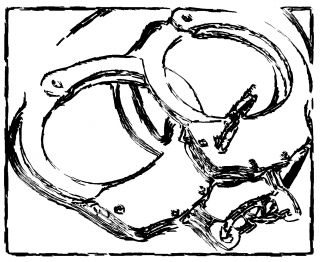Bias
No Discrimination in the Criminal Justice System?
Thoughts on how to report news of a study that might fan the flames of hatred
Posted March 13, 2013

Just by its subject line, the email changed my day and my outlook on my responsibilities as a journalist.
Because I contribute to Scientific American and Discover magazines, I receive embargoed press releases from a variety of scholarly journals. (An “embargoed” release is sent to journalists who have promised in writing not to disclose the release’s contents until after a certain date.)
This particular email came about a week ago. It announced the results of a study in the journal Personality and Individual Differences. “No Evidence of Racial Discrimination in Criminal Justice Processing: Results from the National Longitudinal Study of Adolescent Health” was its title. Got that? The claim was that a large, national study found no evidence of discrimination in the criminal justice system.
But we all know that America’s prisons are filled disproportionately with African American men. The received wisdom is that, from arrest through conviction, the odds are stacked against them. Cops, prosecutors, judges, and juries don’t like them, or so we “know.”
Intrigued, I had the full text sent to me.
Indeed, investigators at seven prestigious universities—six in America and one in Saudi Arabia—had together examined data collected in waves over 14 years in America. In 1994 and 1995 about 90,000 middle school and high school boys and girls were surveyed. Then much smaller groups were re-surveyed periodically, most recently in 2008. By that year some of the “children” were 32 years old. Accordingly, the survey was changed to include questions about marital status, employment history, highest level of education, and (importantly) contact with the criminal justice system.
For their look at racism in that system, this study’s researchers examined only responses from African American and White males. Probably to no one’s surprise, African Americans proved more likely than Whites to be arrested, incarcerated, and receive long criminal sentences. More unexpectedly, perhaps, African Americans self-reported more violent behavior. Furthermore, tests showed they had significantly lower IQ scores.
Reading the study, I thought it a no-brainer that casually reporting it could feed stereotypes about the Beastliness of Black Brutes. Still, I suspected that its observations were important in ways I had yet to understand. So I decided to hang back and see how other journalists responded to the press release. But as far as I can tell, no national media have picked up on the story. Perhaps all journalists are as stymied as I with the problem of how even to begin. (Is our collective hesitation evidence for a liberal bias in the media? That's actually an interesting question.)
No doubt, next month in Personality and Individual Differences a spectrum of especially informed voices will pile on with replies and retorts; that’s how scholarly discussion goes and how the truth of the matter usually shakes out. But the more I think about the study, the more I wonder about its conclusions. After all, what the researchers looked at were attributes of young men, not of the criminal justice system. So why did the paper's title and its conclusions even mention the criminal justice system? I do appreciate the care with which the researchers seem to have limited their pronouncements. For example, they claimed to have found no evidence of racism in the criminal justice system. They specifically did not say that no racism exists. Good job on that point, guys. (Everyone on the team was male.)
And of course this study’s paper doesn’t tell the whole story. Nor (to their credit) do its authors pretend that it does.
I’ve been taught to report just the facts of scientific research and to place facts in context by interviewing a range of experts and getting them to editorialize. But what I’ve learned in a week of watching this intriguing headline slip through the journalistic cracks is that, when no one wants to talk about a delicate matter, the rules about impartiality can be ignored—transparently so, mind you. Anyway, here I go editorializing, all on my own:
If the data in this research prove to be sound, its conclusions about the criminal justice system are still off the mark. One needs to examine the criminal justice system itself in order to pronounce about its integrity. The real matter at hand, though, is what if the data about White vs. African Americans hold water? They suggest that, more than white men, African American men engage in violence—and, on average, their IQs are lower. Ouch. But, as the saying goes, “context is everything.” Decades of research have associated poor education with low scores on intelligence tests. Another mountain of research has shown that a lifetime of being routinely denied access to common courtesies, to just returns on one’s labors, and to whatever pot of gold may be at the end of life’s big rainbow could drive a man to drink, drugs, and maybe even violence.
There. That felt good to put on paper. I wanted so badly to write about this study. Let me be clear: By no means do I want to assign blame for any violent actions away from perpetrators and on to vague societal forces. I do hope, however, that this particular study’s startling, possibly sound, and perhaps even enlightening comparison of White and African American men who came of age between 1994 and 2008 can also be enlivening. I hope in particular that it reminds us as a society to address repression and its ugly and pervasive repercussions.
* * *
Beaver, K. M., et al. No evidence of racial discrimination in criminal justice processing: Results from the National Longitudinal Study of Adolescent Health. Personality and Individual Differences (2013), http://dx.doi.org/10.1016/j.paid.2013.01.020
Rebecca Coffey is author of MURDERS MOST FOUL: And the School Shooters in Our Midst (Vook, 2012).




